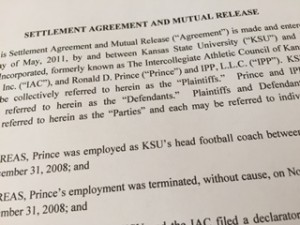Settlement agreements memorializing amounts paid by public agencies to end legal disputes are public records under the Kansas Open Records Act (KORA) and thus subject to disclosure, even if the parties to the dispute attempt to keep the agreement confidential. As long as settlement documents are retained by the agency in the ordinary course of business, they are public records as defined by K.S.A. 45-217(g)(1). Under the definition, “public records” means “any recorded information, regardless of form or characteristics, which is made, maintained or kept by or is in the possession of any public agency including, but not limited to, an agreement in settlement of litigation involving the Kansas public employees retirement system and the investment of moneys of the fund.”
The non-exhaustive reference to “an agreement in settlement” related to the Kansas public employees retirement system (KPERS) is key. It provides statutory authority for the rule that settlement agreements by public agencies generally are public records. If the Legislature had meant to subject only KPERS-related settlements to the definition of public records, it could have done so. But it did not, and the “including, but not limited to” language of K.S.A. 45-217(g)(1) indicates that settlement agreements of any other agency are also subject to the definition of public records and are disclosable under K.S.A. 45-218(a) when requested by any person.
Further, Attorney General Opinion No. 93-55, which includes a finding that a confidential settlement agreement involving a public agency “would be considered as invalid against public policies expressed in the KORA,” is particularly instructive. There, a city attorney sought to rely on K.S.A. 45-221(a)(30) as a basis to refuse to disclose a settlement agreement, citing the privacy of the individuals involved.
In rejecting the city’s position, the AG’s office noted that federal courts, upon review of a similar privacy provision in the Freedom of Information Act (FOIA), “have held that embarrassment alone does not suffice to justify nondisclosure, Simms v. CIA, 642 F.2d 562 (D.C. 1980), and recognized that if the invasion of privacy is insubstantial, a superior public interest in disclosure prevails, Campbell v. U.S. Civil Services Commission, 539 F.2d 58 (10th Cir. 1976). Attorney General Opinion No. 91-50.”
The AG’s office then set forth the following rule to govern when a settlement agreement may contain a confidentiality clause: “application of the personal privacy exemption of the KORA depends on the nature of the terms of the settlement agreement. Only when disclosure clearly invades personal privacy of the party involved in the agreement, may it possibly be closed under this exemption.”
Otherwise, the AG’s office found “no authority for the city to discretionarily close the settlement agreement, absent facts to establish personal privacy;” that a “confidentiality clause” in a settlement agreement “would be considered as invalid against public policies expressed in the KORA”; and that “(i)f a public agency does not independently have the authority to close a public record, neither it nor its agents have the authority to contractually agree to such a term or
requirement. If an agreement binds the parties, or either of them, to do something opposed to the public policy of the state, it is illegal and absolutely void. An agreement is against public policy if it is injurious to the interests of the public, contravenes some established interest in society, violates some public statute, or tends to interfere with the public welfare or safety. Hunter v. American Rentals, 189 Kan. 615 (1962).”
Moreover, even if portions of the settlement agreement would clearly invade the personal privacy of a party, and thus justify non-disclosure of such portions under K.S.A. 45-221(a)(30), the agreement should still be redacted to remove the clearly invasive material and otherwise disclosed as required by K.S.A. 45-221(d).
This is not to say that agencies do not already comply with the law. For example, the Kansas Corporation Commission (KCC) disclosed the details of a settlement agreement in response to a KORA request made by the Topeka Capital-Journal earlier this year. Public agencies throughout the state should look to this example, the above-referenced Attorney General opinion, and K.S.A. 45-217(g)(1) itself to determine that settlement agreements are subject to disclosure under KORA.
Max Kautsch is the Kansas legal hotline attorney for the Kansas Press Association and the Kansas Association of Broadcasters. Send him an email here.

